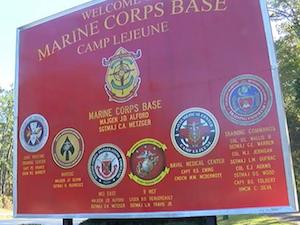Help Center
Online Resource Center for Information on Birth Injuries.
For over 3 decades, the drinking water at the Camp Lejeune Marine Corps base in North Carolina was highly contaminated with toxic chemicals. Extensive scientific research on the health impacts of this water contamination has shown that exposure to the toxic water at Camp Lejeune during pregnancy caused significantly higher rates of birth defects.

Camp Lejeune is a very big Marine Corps base and training compound located on the North Carolina coast next to the town of Jacksonville, NC. Like many large military bases, Camp Lejeune is like a small town with its own resident population of military personnel and their families.
Camp Lejeune has always had family housing units on-base for resident officers and enlisted men with wives and families. The Marine Corps also operates a hospital on-base at Camp Lejeune. Over the years, thousands of pregnant women have lived at Camp Lejeune and thousands of babies have been born on the base.
Camp Lejeune has its own independent water supply system that provides potable water to the on-base residents and employees. The system draws groundwater from large well pumps. In the 1980s, new federal regulations prompted the Marine Corps to perform quality testing on the Camp Lejeune water supply for the first time. This testing led to the alarming discovery that the Camp Lejeune water was basically poisoned. It was later determined that the water had been contaminated from 1953 until 1987.
The water at Camp Lejeune contained toxic industrial chemicals at extremely high levels. In some cases, the level of these chemicals in the Camp Lejeune water supply was several thousand times higher than the maximum safe limits set by the FDA. The primary chemicals in the Lejeune water were the chlorinated solvents perchloroethylene (PCE) and trichloroethylene (TCE).
Both TCE and PCE are known to be toxic to the human body and are considered carcinogens. It is estimated that over 20,000 women were exposed to these chemicals in the contaminated water during pregnancy.
The discovery of the contaminated water at Camp Lejeune has led to decades of comprehensive research by public health agencies, including the Agency for Toxic Substances and Disease Registry (ATSDR), which is a division of the CDC, and by the National Research Council. The research by the ATSDR and other agencies has found clear evidence that exposure to the contaminated Camp Lejeune water during pregnancy led to significantly higher rates of birth defects.
The most authoritative study on the link between the toxic water at Camp Lejeune and birth defects is the ATSDR Birth Defects and Childhood Cancer Study (the “ATSDR Study”) which was published in 2014. The ATSDR study analyzed health data for 12,598 children with prenatal exposure to the Camp Lejeune toxic water. These were children born to mothers who either lived or worked at Camp Lejeune between 1968 and 1985, which was the peak of the water contamination period. Historical water contamination modeling was used to estimate the level of in utero chemical exposure for child in the study.
The ATSDR Study concluded that exposure to the contaminated Camp Lejeune water during pregnancy caused a major increase in the risk of certain birth defects. Babies with in utero exposure to the toxic Lejeune water were 4 times more likely to be born with neural tube birth defects (e.g., spina bifida and anencephaly) compared to the control group.
The study found that oral cleft defects were also present in the Camp Lejeune babies at significantly higher rate than the control group. The exposure modeling data also suggested a clear correlation between birth defect rates and the level of prenatal exposure to the Camp Lejeune water. More exposure to the Lejeune water equaled higher rates of birth defects.
In 2015, the Department of Veterans Affairs (“VA”) formed a special committee of prominent experts to examine all of the evidence, including the prior public health studies, and provide formal clinical guidance to the VA on what health conditions were associated with the Camp Lejeune water based on valid evidence.
The resulting guidance that the VA Committee provided was published as VA Clinical Guidance on the Health Conditions Identified by the Camp Lejeune Legislation. The VA Committee guidance report advised that there was valid and compelling scientific evidence establishing that increased rates of neural tube birth defects were caused by the water at Camp Lejeune:
The committee concludes that neural tube defects may have resulted from in utero exposures to [PCE and TCE] in the contaminated drinking water at Camp Lejeune.
In August 2022, Congress passed a new federal law called the Camp Lejeune Justice Act (“CLJA”). The CLJA gives victims of the Camp Lejeune water contamination the ability to file civil lawsuits against the government and seek financial compensation for birth defects and other injuries caused by the contaminated water at Camp Lejeune. Learn more about Camp Lejeune birth defect lawsuits.